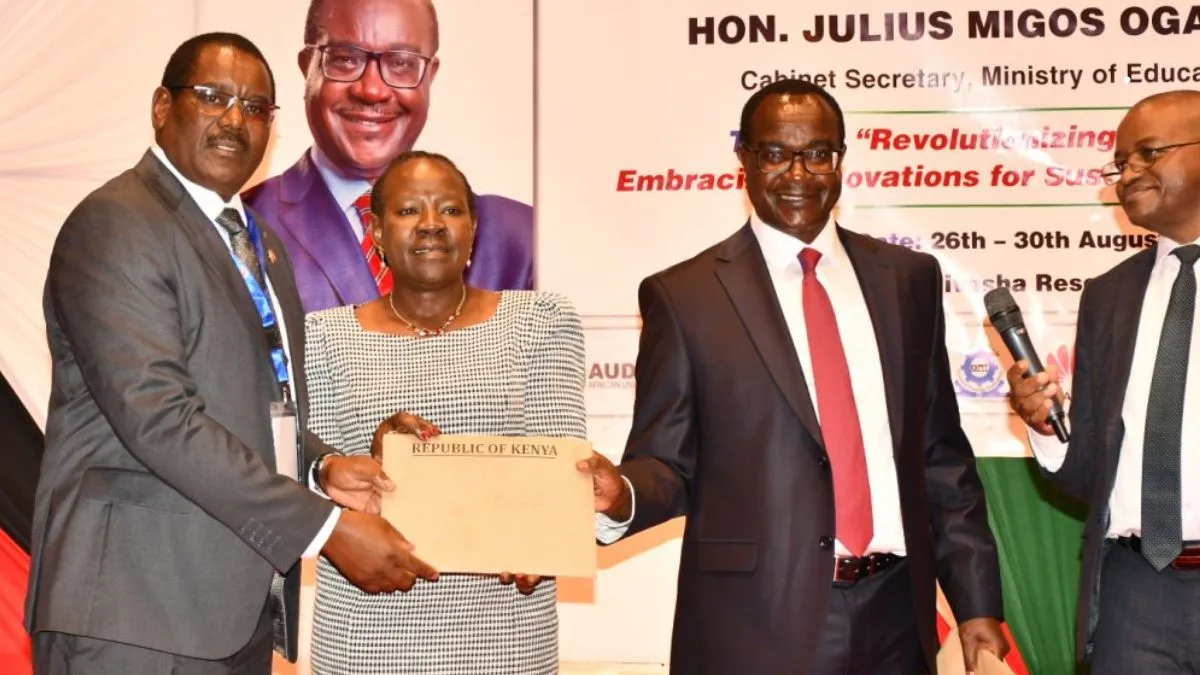Ministry of Education Deploys 2,000 Trainers to 242 TVETS Institutions
The Ministry of Education has recently deployed 2,000 new trainers to Technical, Vocational Education Training Institutions (TVETs) across the country. This move aims to address the trainer-student ratio and ensure that training provided aligns with market demands.
These trainers have been assigned to 242 institutions, bringing the total number of trainers to 9,351, serving a student population of 420,559. The student population is expected to grow to over 700,000 in the coming years.
Julius Ogamba, the Ministry’s Cabinet Secretary (CS), announced that the government is planning to hire an additional 6,000 trainers to further mitigate the current deficit and enhance the quality of education.
The goal is to foster innovation and creativity among learners. Ogamba emphasized that the Ministry is collaborating with the National Treasury to facilitate the disbursement of Sh3.3 billion in capitation, as well as scholarship grants and loans for trainees.
This financial support is intended to ensure continuous and uninterrupted learning in all TVET institutions.
Follow Teachers Updates Page On Facebook
During the 54th Annual International Conference of Technical Universities and Polytechnics held in Naivasha, Ogamba noted that the newly appointed trainers would play a crucial role in implementing Competency-Based Education and Dual Training systems.
The CS highlighted that the addition of these trainers is essential for producing graduates with highly employable skills that meet both local and global standards.
Ongoing Curriculum Review and New Policy Development
With the increasing number of students in TVET institutions, the government is revising the curriculum to better align it with market demands. The review includes the introduction of new courses in areas such as marine and firefighting, aimed at filling specific skills gaps.
Ogamba also mentioned that the Ministry is developing a Continuous Professional Development policy. This policy will ensure that trainers are regularly retooled to keep up with technological advancements and evolving industry needs.
Principal Secretary (PS) in charge of TVETs, Dr. Esther Muoria, stressed the importance of leveraging technology and adopting innovative training methods to address existing skills gaps and competencies.
“TVETs training if well aligned will unlock opportunities that will address the local and continent challenges of rising youth unemployment, demand for skilled workforce and pressing needs for economic diversification,” said the PS.
The focus, she stated, is on training with the end goal in mind, which involves partnering with industry players who provide hands-on experience. Integrating cutting-edge technologies and equipment in training is now a priority for TVET institutions.
Dr. Muoria also highlighted that trainers are now tasked with fostering critical thinking and problem-solving skills among students. This approach is crucial for preparing trainees to thrive in the dynamic and competitive global job market.
She expressed that well-aligned TVET training could unlock opportunities to address local and continental challenges, including rising youth unemployment and the need for economic diversification.
Advancing Continental Standards and Sustainable Financing
Kenya is one of 23 African nations implementing the Africa Continental Qualifications Framework, which aims to harmonize education standards across the continent.
The framework seeks to facilitate mobility and transparency of skills and qualifications, supporting the African Union’s Agenda 2063. Dr. Muoria noted that innovativeness in TVET institutions could harness the potential of Africa’s youth.
ALSO READ: KUPPET Writes to Teachers Service Commission (TSC) For Talks
The PS also advocated for sustainable financing models involving both public and private sectors. Such investments are vital for TVET institutions to continue providing cutting-edge, competitive training to learners.
As Kenya marks 100 years of TVET, the government has begun implementing the Prior Learning policy. This policy assesses and certifies non-formal skilled personnel, and over 700 graduates have already been certified following assessments of their technical skills at national technical institutions.
Ministry of Education Deploys 2,000 Trainers to 242 TVETS Institutions
Follow Teachers Updates on Facebook, LinkedIn, X (Twitter), WhatsApp, Telegram, and Instagram. Get in touch with our editors at [email protected].


Discussion about this post